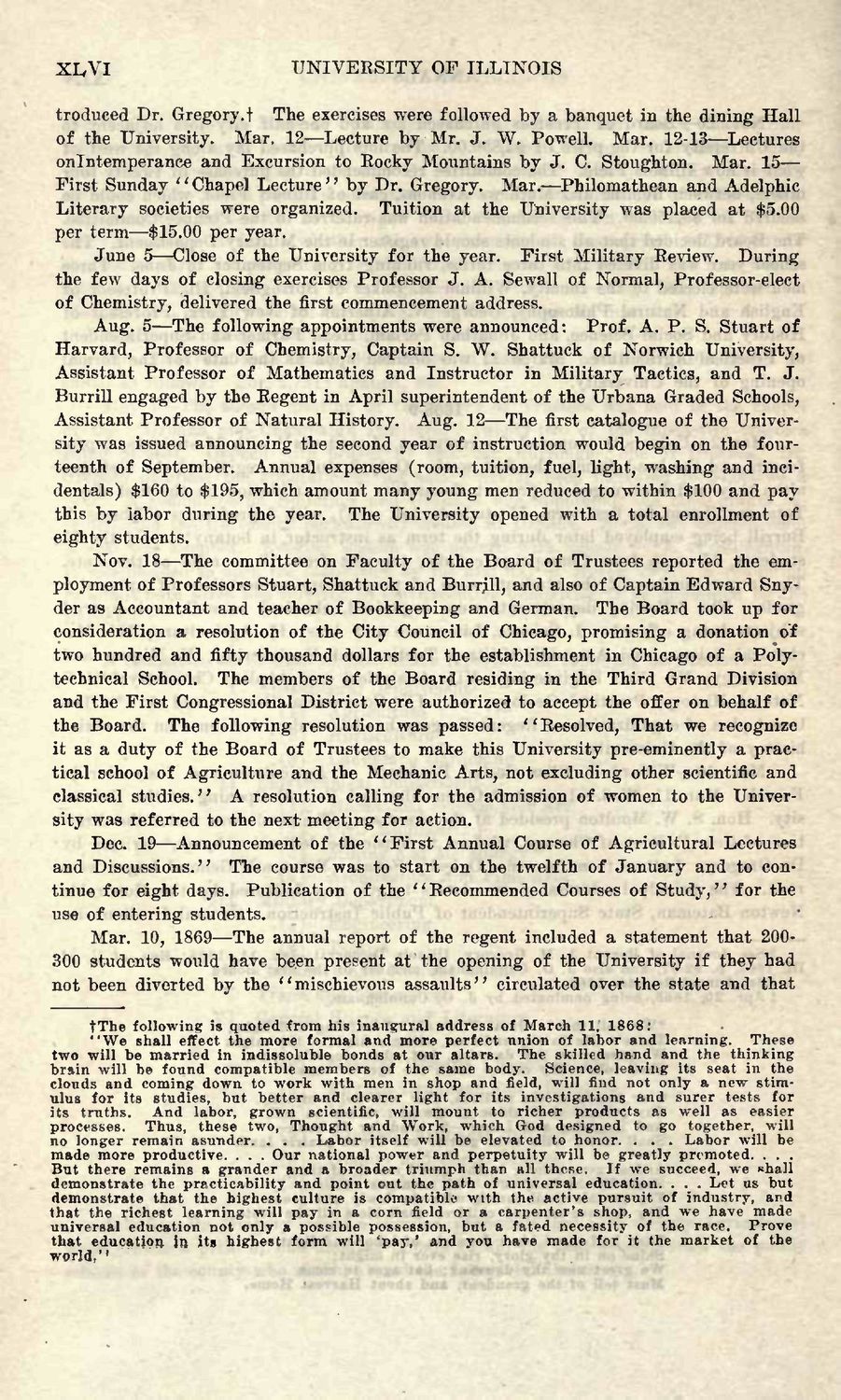| |
| |
Caption: Book - Early History of University (1916)
This is a reduced-resolution page image for fast online browsing.

EXTRACTED TEXT FROM PAGE:
XL,VI U N I V E R S I T Y OF I L L I N O I S troduced Dr. Gregory.t The exercises were followed by a banquet in the dining H a l l of the University. Mar, 12—Lecture by Mr. J . W. Powell. Mar. 12-13—Lectures onlntemperance and Excursion to Rocky Mountains by J. C. Stoughton. Mar. 15— First Sunday "Chapel L e c t u r e " by Dr. Gregory. Mar.—Philomathean and Adelphic Literary societies were organized. Tuition at the University was placed at $5.00 per term—$15.00 per year. June 5—Close of the University for the year. First Military Review. During the few days of closing exercises Professor J . A. Sewall of Normal, Professor-elect of Chemistry, delivered the first commencement address. Aug. 5—The following appointments were announced: Prof. A. P. S. Stuart of Harvard, Professor of Chemistry, Captain S. W. Shattuck of Norwich University, Assistant Professor of Mathematics and Instructor in Military Tactics, and T. J . Burrill engaged by the Regent in April superintendent of the Urbana Graded Schools, Assistant Professor of Natural History. Aug. 12—The first catalogue of the University was issued announcing the second year of instruction would begin on the fourteenth of September. Annual expenses (room, tuition, fuel, light, washing and incidentals) $160 to $195, which amount many young men reduced to within $100 and pay this by labor during the year. The University opened with a total enrollment of eighty students. Nov. 18—The committee on Faculty of the Board of Trustees reported the employment of Professors Stuart, Shattuck and Burrjll, and also of Captain Edward Snyder as Accountant and teacher of Bookkeeping and German. The Board took up for consideration a resolution of the City Council of Chicago, promising a donation of two hundred and fifty thousand dollars for the establishment in Chicago of a Polytechnical School. The members of the Board residing in the Third Grand Division and the First Congressional District were authorized to accept the offer on behalf of the Board. The following resolution was passed: "Resolved, That we recognize it as a duty of the Board of Trustees to make this University pre-eminently a practical school of Agriculture and the Mechanic Arts, not excluding other scientific and classical s t u d i e s . " A resolution calling for the admission of women to the University was referred to the next meeting for action. Dee. 19—Announcement of the " F i r s t Annual Course of Agricultural Lectures and Discussions." The course was to start on the twelfth of January and to continue for eight days. Publication of the ' ' Recommended Courses of Study,'' for the use of entering students. Mar. 10, 1869—The annual report of the regent included a statement that 200300 students would have been present at the opening of the University if they had not been diverted by the "mischievous a s s a u l t s " circulated over the state and that tThe following is quoted from his inaugural address of March 11,' 1868: " W e shall effect the more formal and more perfect union of labor and learning. These two will be married in indissoluble bonds at our altarb. The skilled hand and the thinking brain will be found compatible members of the same body. Science, leaving its seat in the clouds and coming down to work with men in shop and field, will find not only a new stimulus for its studies, but better and clearer light for its investigations and surer tests for its truths. And labor, grown scientific, will mount to richer products as well as easier processes. Thus, these two, Thought and Work, which God designed to go together, will no longer remain asunder. . . . Labor itself will be elevated to honor. . . . Labor will be made more productive. . . . Our national power and perpetuity will be greatly promoted. . . . But there remains a grander and a broader triumph than all these. If we succeed, we Khali demonstrate the practicability and point ont the path of universal education. . . . Let us but demonstrate that the highest culture is compatible with the active pursuit of industry, and that the richest learning will pay in a corn field or a carpenter's shop, and we have made universal education not only a possible possession, but a fated necessity of the race. Prove that education in its highest form will 'pay,' and you have made for it the market of the world,' 1
| |